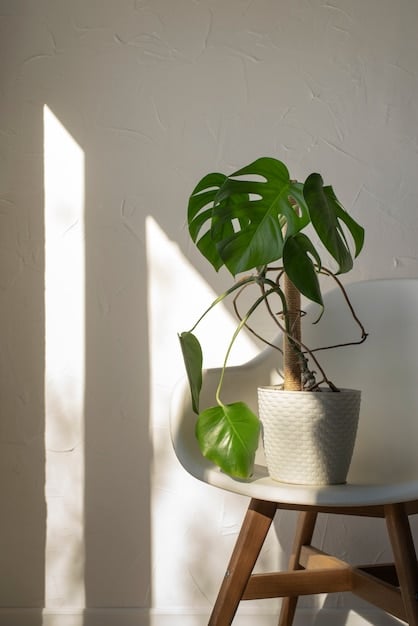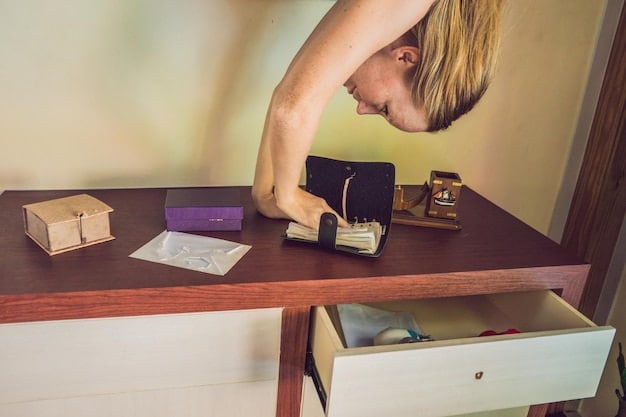The Zen of Simplicity: Find More Space by Living with Less

The Zen of Simplicity encourages individuals to declutter their lives, focusing on essential elements to cultivate mindfulness and create space for meaningful experiences, ultimately enhancing well-being and fostering a deeper connection with the present moment.
In today’s fast-paced world, it’s easy to get caught up in accumulating possessions and chasing after the next big thing. However, the **Zen of Simplicity: Living with Less to Create More Space for What Matters** offers a refreshing alternative, inviting us to declutter our lives and focus on what truly brings us joy and fulfillment.
Understanding the Essence of Simple Living
Simple living isn’t about deprivation; it’s about intentionality. It’s a conscious choice to reduce the distractions and clutter in our lives, allowing us to concentrate on what truly matters. This approach, rooted in Zen principles, emphasizes mindfulness and being present in the moment.
The Roots of Zen Philosophy
Zen Buddhism teaches that suffering arises from attachment and craving. By simplifying our lives and letting go of unnecessary possessions, we can reduce these attachments and find greater peace.
Benefits of Embracing Simplicity
The benefits extend far beyond just a tidier home. Simple living can lead to reduced stress, increased financial freedom, and more time for activities and relationships that are important to us.

By consciously curating our surroundings and commitments, we can create a life that aligns with our values and supports our well-being.
- Reduced Stress: Less clutter, less to manage, less to worry about.
- Financial Freedom: Spending intentionally frees up resources for experiences and investments.
- More Time: Less time spent managing possessions means more time for passions.
Ultimately, simple living is a pathway to a more meaningful and fulfilling existence. It allows us to focus on experiences rather than things, fostering a deeper appreciation for the present moment.
Decluttering Your Physical Space
Decluttering is often the first step towards embracing simplicity. It involves systematically removing unnecessary items from our homes, creating a more spacious and peaceful environment. This process extends beyond just tidying up; it’s about making mindful decisions about what we choose to keep.
The KonMari Method
Made famous by Marie Kondo, this method encourages you to ask yourself if an item “sparks joy.” If it doesn’t, it’s time to let it go. This emotional connection helps in making tough decisions.
The 90/90 Rule
If you haven’t used an item in the past 90 days and don’t anticipate needing it in the next 90, consider donating or discarding it. This rule helps to identify items that are truly unnecessary.
Start with one area at a time, such as a closet, drawer, or shelf. This prevents overwhelm and allows you to focus your energy effectively. As you declutter, consider the environmental impact of your choices.
- Donate: Give usable items to charities or shelters.
- Recycle: Properly dispose of materials like paper, plastic, and electronics.
- Repurpose: Find new uses for items instead of discarding them.
Decluttering your physical space is not just about aesthetics; it’s about creating a living environment that supports your well-being and reflects your values. A clutter-free space promotes clarity and calmness.
Simplifying Your Digital Life
In today’s digital age, clutter isn’t limited to our physical spaces. Our digital lives can be just as overwhelming, filled with endless notifications, emails, and social media distractions. Simplifying our digital presence is crucial for maintaining focus and mental well-being.
Start by unsubscribing from unnecessary email lists and muting notifications from apps that distract you. Designate specific times for checking emails and social media, rather than constantly reacting to every ping and buzz. Organize your digital files and delete anything that is no longer needed.
Consider using apps and tools that help you manage your time and block out distractions. There are numerous options available for both desktop and mobile devices. Embrace digital minimalism by removing unnecessary apps from your phone and limiting your social media consumption.
Creating boundaries around technology use is essential for regaining control of your time and attention. This allows you to be more present in the real world and focus on activities that truly enrich your life.
Mindful Consumption and Conscious Spending
Mindful consumption is about being aware of our purchasing habits and making conscious choices about what we bring into our lives. It involves questioning our motivations for buying things and considering the long-term impact of our consumption on the environment and our own well-being.
Before making a purchase, ask yourself if you truly need the item or if you’re simply buying it out of boredom or emotional impulse. Avoid impulse purchases by waiting a day or two before buying something you don’t immediately need. Consider the quality and durability of items before buying them. Investing in fewer, higher-quality items can save you money in the long run and reduce waste.

Support companies that prioritize sustainability and ethical practices. This aligns your spending with your values and promotes responsible consumption. Embrace minimalism by focusing on experiences rather than things. Often, the most memorable moments in life are those that don’t involve material possessions.
Conscious spending is not about deprivation; it’s about aligning your financial resources with your values and priorities. By making mindful choices about how you spend your money, you can create a life that is both fulfilling and sustainable.
Cultivating Mindfulness in Daily Life
Mindfulness is the practice of paying attention to the present moment without judgment. It involves being fully aware of our thoughts, feelings, and surroundings, allowing us to appreciate the simple pleasures of life and respond to challenges with greater calm and clarity. Cultivating mindfulness is closely tied to **The Zen of Simplicity: Living with Less to Create More Space for What Matters**.
Meditation is a powerful tool for cultivating mindfulness. Even just a few minutes of daily meditation can have a profound impact on your mental and emotional well-being. Start by finding a quiet space where you can sit comfortably without distractions. Focus on your breath, noticing the sensation of each inhale and exhale. When your mind wanders, gently guide it back to your breath.
Practice mindful eating by paying attention to the taste, texture, and aroma of your food. Avoid distractions like phones or television while eating. Engage in mindful movement by practicing yoga, tai chi, or simply going for a walk in nature. Pay attention to the sensations in your body as you move.
Incorporate mindfulness into your daily routines, such as washing dishes, brushing your teeth, or commuting to work. By being fully present in each moment, you can transform ordinary activities into opportunities for connection and appreciation. Mindfulness is not about escaping reality; it’s about embracing it fully.
Creating Space for What Matters
Ultimately, the goal of simple living is to create more space for what truly matters in our lives. This involves identifying our values and priorities and making intentional choices that align with them.
Prioritizing Relationships
Nurture meaningful connections with family and friends. Spend quality time with loved ones, engaging in activities that foster connection and joy.
Pursuing Passions
Dedicate time to hobbies and interests that bring you joy and fulfillment. Engage in activities that challenge you and allow you to express your creativity.
Set clear boundaries between your work life and your personal life. Avoid overcommitting yourself and learn to say “no” to requests that don’t align with your priorities. Create a daily routine that incorporates activities that nourish your mind, body, and spirit.
- Time in Nature: Spend time outdoors, connecting with the natural world.
- Creative Expression: Engage in activities like painting, writing, or music.
- Meaningful Work: Pursue work that aligns with your values and passions.
Creating space for what matters is about designing a life that is rich in experiences and relationships, rather than material possessions. A life focused on what promotes well-being and self-discovery.
| Key Point | Brief Description |
|---|---|
| 🧘 Mindfulness | Practice present moment awareness without judgment. |
| 🏠 Decluttering | Remove unnecessary items to simplify physical space. |
| 📱 Digital Detox | Limit digital distractions for mental well-being. |
| 💰 Conscious Spending | Make mindful purchasing choices aligned with values. |
Frequently Asked Questions
▼
The Zen of Simplicity is a lifestyle that focuses on reducing clutter and distractions to create space for meaningful experiences and mindfulness. It emphasizes intentional living and being present in the moment.
▼
Start with one area at a time, like a closet or drawer. Use methods like the KonMari method (does it spark joy?) or the 90/90 rule (haven’t used it in 90 days?). Donate, recycle, or repurpose unwanted items.
▼
Unsubscribe from unnecessary emails, mute notifications, and limit social media consumption. Organize digital files and use apps to manage your time. Set boundaries around technology use for better focus.
▼
Mindful consumption involves being aware of your purchasing habits and making conscious choices. Ask yourself if you truly need something before buying it and consider the long-term impact of your consumption.
▼
Creating space for what matters allows you to prioritize relationships, pursue passions, and engage in activities that nourish your mind, body, and spirit. It enriches your life with experiences over possessions.
Conclusion
Embracing The Zen of Simplicity: Living with Less to Create More Space for What Matters is a transformative journey towards a more intentional and fulfilling life. By decluttering our physical and digital spaces, practicing mindful consumption, and cultivating mindfulness in our daily routines, we can create a life that is rich in experiences, relationships, and meaning.





